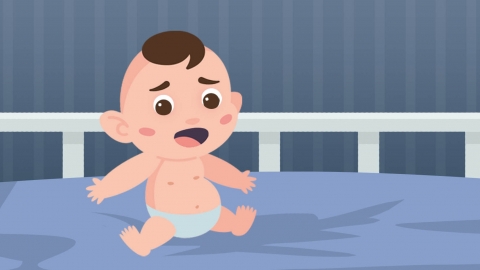What causes a young child's dry cough without phlegm?
Generally, a baby's dry cough without phlegm may be caused by dry air, milk aspiration or foreign body irritation, common cold, allergic cough, or cough-variant asthma. It is recommended to seek timely medical attention and follow the guidance of a physician for treatment. A detailed explanation is as follows:

1. Dry Air
When the humidity level in the environment is low, moisture on the respiratory mucosa evaporates quickly, causing the mucosa to become dry and fragile. This can stimulate cough receptors in the respiratory tract, leading to a dry cough without phlegm in babies. In daily life, placing a bowl of water indoors can help increase humidity through natural evaporation.
2. Milk Aspiration or Foreign Body Irritation
Babies' swallowing functions are not yet fully developed. If they feed too quickly or in an improper position, milk aspiration can easily occur. Additionally, due to their curiosity, babies may place small objects into their mouths accidentally inhaling them into the airway. The irritation of milk or foreign bodies on the airway mucosa triggers a cough reflex aimed at expelling the irritants, resulting in a dry cough without phlegm. Proper feeding posture is important, with the baby's head slightly elevated, and the feeding speed should not be too fast.
3. Common Cold
The common cold is usually caused by viral infections, such as rhinovirus or influenza virus. When viruses invade the upper respiratory tract, they cause congestion and swelling of the respiratory mucosa. The resulting inflammation stimulates cough receptors in the respiratory tract, leading to a dry cough. In the early stages of infection, when inflammation is mild, phlegm production may not yet occur, resulting in a dry cough without phlegm. Other symptoms may include sneezing, nasal congestion, and runny nose. Affected infants may take medications such as pediatric paracetamol, chlorpheniramine, and artificial cow-bezoar as directed by a physician.
4. Allergic Cough
Allergic cough may be related to a baby's exposure to allergens such as pollen, dust mites, or animal dander. The immune system identifies these substances as harmful and initiates an immune response. During this process, inflammatory mediators such as histamine are released, irritating the respiratory tract and making it hyper-responsive, which can lead to a dry cough without phlegm. Other symptoms may include nasal itching, eye itching, and skin itching. Infants should follow medical advice to use medications such as loratadine syrup, cetirizine hydrochloride drops, or montelukast sodium chewable tablets to alleviate symptoms.
5. Cough-Variant Asthma
Cough-variant asthma may be related to genetic and environmental factors. Chronic inflammation exists in the airways of infants, and when exposed to triggers such as cold air, physical activity, or irritating odors, cough receptors are stimulated, causing a dry cough without phlegm. Other symptoms may include wheezing and chest tightness. Infants can use medications such as salbutamol aerosol, budesonide suspension, or montelukast sodium granules for treatment under a doctor's guidance.
In daily life, maintaining a clean indoor environment, regularly cleaning rooms to reduce dust and allergens, and dressing the baby appropriately according to weather changes to prevent colds are important.







